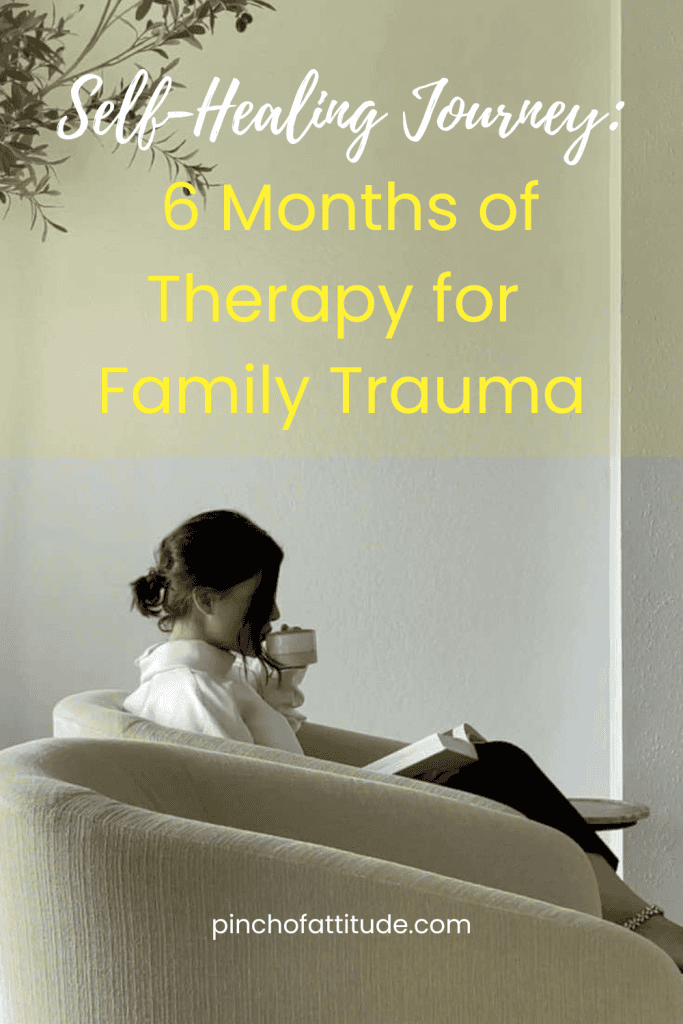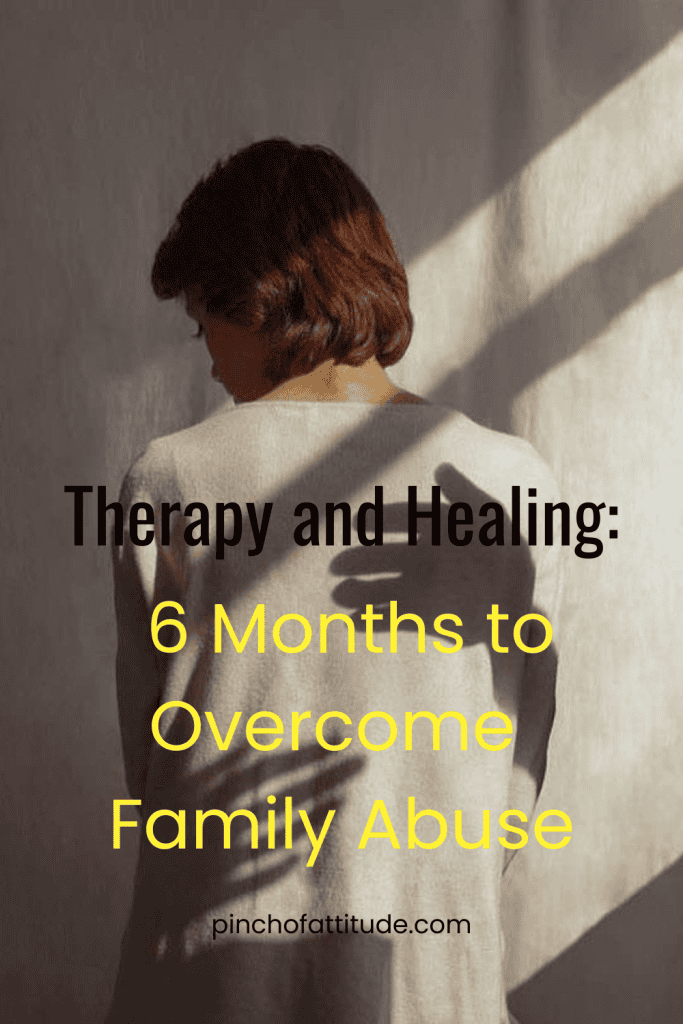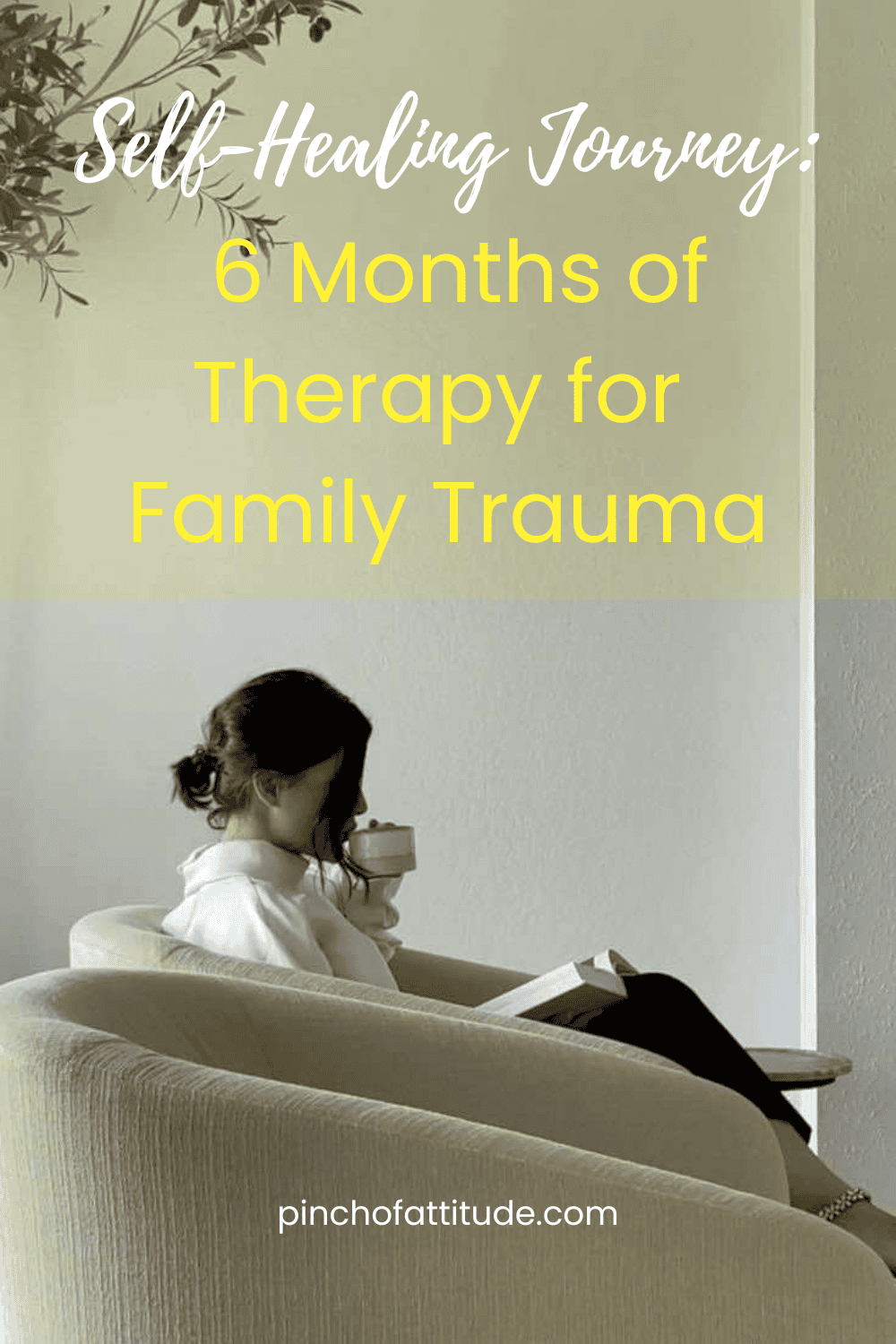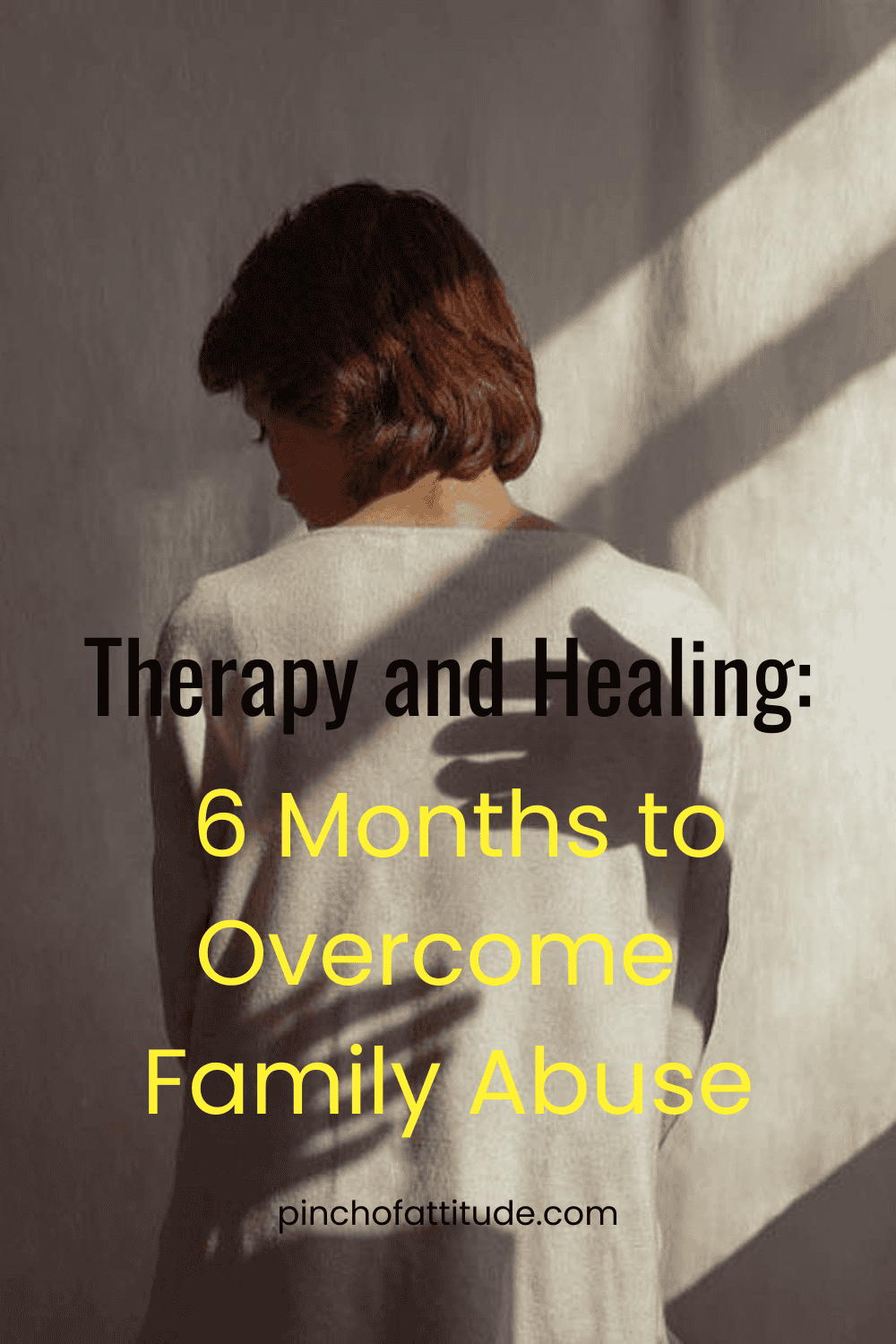Therapy isn’t something I thought I’d ever try, but life has its way of nudging us towards paths we didn’t anticipate.
You know, I used to have serious doubts about therapists, I thought most of them were pretty ineffective.
But when I hit 25, there I was, sitting in a therapist’s office. And thankfully, I got a pretty good one.
On that first day, all these emotions just poured out of me.
I cried like I hadn’t cried in years, letting go of so much pent-up pain from being emotionally abused by my narcissistic mother.
And you know what? My therapist didn’t even charge me for our first session together, which really set the tone for what became an incredible six-month healing journey.
We dug into layers of trauma and hurt. It wasn’t easy, but with his guidance, I started to confront my past and actually started to slowly heal.
After those six months, my therapist told me it was time to move forward, which was a clear sign of the progress we’d made.
This experience showed me that the right therapist can be a big help, giving you support and guidance exactly when you need it.
Stick with me as I share how six months of therapy helped me heal from the shadows of family abuse.
- Seeking therapy for family abuse can be daunting due to various emotional and practical hurdles.
- Therapy provides a safe space for you to be heard and understood, helping you to handle your emotions, reclaim your self-worth, and process trauma in healthier ways.
- Take the time to research, test the waters with consultations, and trust your instincts in selecting a therapist who aligns with your needs.
Table of Contents
Challenges You Might Face When Seeking Therapy

When you’re dealing with family abuse, getting into therapy can feel like stepping into the great unknown.
It’s like trying to find a needle in a haystack to discover that perfect therapist who really gets what you’re going through. This was exactly what happened to me many years ago.
Building that genuine connection and trust with your therapist takes time and effort. I was fortunate enough to easily find the one I could stick with for six months.
For some, you might bump into a few intimidating hurdles while seeking therapy that can make taking that first healing step seem pretty tough:
- Fear of Judgment: There’s this constant worry about being judged by others, whether it’s family members or society, for opening up about private family stuff.
- Sense of Shame: Survivors of family abuse often carry this deep sense of shame or guilt, like somehow they’re to blame for what went down or should’ve stopped it.
- Lack of Trust: After being let down or mistreated by family, it’s totally normal to struggle with trusting anyone new, including therapists.
- Emotional Vulnerability: Putting your painful experiences out there can leave you feeling emotionally exposed, which is scary and uncomfortable.
- Financial Concerns: Therapy costs can be a real roadblock for many. The stress about affording sessions or whether insurance covers them can put a damper on seeking help.
- Limited Support System: Some people don’t have that supportive circle of friends or family who get it or push for therapy.
- Cultural or Religious Barriers: Cultural or religious beliefs might make therapy seem taboo or discourage talking about family issues outside the community.
Summoning the courage to reach out for help can be overwhelming, especially when you’ve been taught to keep family matters under wraps.
Tip
Always keep in mind that you deserve support and healing. Therapy offers a safe space to tackle these obstacles and move toward recovery.
7 Ways Therapy Worked for My Healing Journey
I totally get that feeling of being on the fence before your first therapy session, wondering if it’s gonna do any good. If you’re in that boat, just know I’ve been there too.
Therapy ain’t some magic bullet, but it can seriously set you on the path to some deep healing.
Here are seven ways it transformed my life:
1. I Felt Heard and Understood
Therapy was a game-changer for me. Finally, I felt like someone really got where I was coming from.
My therapist made this safe space where I could spill out all my deepest hurts without worrying about being judged.
Their empathy and understanding made me feel like I wasn’t going through it alone.
Having someone listen to my story without cutting in was empowering like nothing else.
2. I Learned to Handle My Emotions
Therapy really schooled me on dealing with my emotions. I started to see how my past was messing with my present feelings.
My therapist hooked me up with some practical tricks like deep breathing, mindfulness, and journaling to keep my emotions in check when they got too wild.
As time went on, I got more tuned in to myself and found it easier to handle tough emotions.
3. I Reclaimed My Self-Worth
Therapy was key in helping me boost my self-worth.
As I kept at it, I started seeing through all those negative beliefs that had been drilled into me over years of abuse.
With therapy, I started building up a better self-image and began to see my strengths and toughness.
This journey of figuring myself out helped me finally embrace my own worth and see how valuable I really am as a person.
4. I Learned How to Process My Trauma in a Healthy Way
My therapist helped me wrap my head around how past stuff was still messing with my present.
We dug into tricks like cognitive reframing and relaxation exercises to tackle those memories and the emotions they bring.
Slowly but surely, I started piecing together what went down and how it’s affecting me now.
Tip
Therapy can give you the guts to face up to your trauma and deal with it in a better, healthier way.
5. I Learned to Build Better Connections

Therapy really clued me in on how to make better connections with people.
My therapist helped me spot these patterns in my relationships that were all tangled up with stuff from the past.
By getting more in tune with myself and picking up some solid communication skills, I started forming deeper, more meaningful bonds with people based on respect and getting each other.
This new skill totally leveled up my interactions and brought a whole new richness to my life.
6. I Regained a Sense of Control Over My Emotions
Chatting things out with my therapist really helped me see things clearer and get a better perspective.
We teamed up to set boundaries, make smarter choices, and figure out where I could step up and take charge.
This gave me the power to break free from my past trauma and start steering my life in the direction I wanted.
7. I Found Coping Strategies That Work for Me
Therapy was where I found my own bag of tricks for dealing with trauma.
My therapist threw all sorts of techniques at me, like mindfulness, building a support network, and even getting into creative stuff like art or writing.
It was all about testing things out and seeing what clicked when I was feeling rough.
Those coping strategies turned into my go-to moves for handling stress and tackling whatever life threw my way.
How Do You Find the Right Therapist for You?
Finding the right therapist is key to getting the most out of therapy.
Here are some tips I picked up along the way:
- Do Your Homework: Check out therapists who specialize in trauma and family abuse. Online directories or recommendations from friends can be a good start.
- Test the Waters: Don’t hesitate to set up consultations with a few therapists. Use this time to see if you vibe with them and if they get what you’re dealing with.
- Get Recommendations: Ask around for recommendations from people you trust – friends, family, or even your doctor.
- Check Their Credentials: Make sure they’re licensed and legit in your area. Look into their background and see if they’ve got experience with survivors of family abuse.
- Trust Your Instincts: Your gut feeling matters. Therapy is personal, so keep looking until you find someone you click with.
- Ask Away: Don’t hold back on questions about their methods and experience. A good therapist will be open and flexible.
Finding the right therapist might take some searching, but it’s worth finding someone who truly supports your healing journey.
Tip
It’s also worth keeping in mind that if you’re paying for therapy and it’s not working out, don’t hesitate to switch things up. Trust yourself to make the best call for your well-being.
Related Posts:
- 15 Surprising Truths I Discovered in Therapy (And Why They Matter)
- 7 Therapies to Heal Trauma from Narcissistic Abuse for Good
- 20 Affirmations For Narcissistic Abuse Survivors
- 5 Types of People You Need While Healing From Narcissistic Abuse
- 30 Days Self-Love Challenge to Recover and Heal From Narcissistic Abuse
Frequently Asked Questions
What are common challenges when seeking therapy for family abuse?
When seeking therapy for family abuse, you might encounter fears of judgment from others or feel a deep sense of shame and guilt about the situation. Additionally, financial concerns and limited support systems can pose significant obstacles to accessing therapy.
How can therapy help survivors of family abuse?
Therapy can empower survivors by providing a safe space to process emotions, tackle trauma, and rebuild self-worth. Through therapy, survivors often learn coping strategies and develop healthier ways to handle difficult experiences.
How did therapy transform the author’s life?
Therapy enabled the author to feel heard and understood, learn emotional management skills, reclaim self-worth, and process past trauma effectively. It also helped build better connections with others and regain a sense of control over their life.
What tips can aid in finding the right therapist for family abuse survivors?
To find the right therapist, consider specialized professionals with experience in trauma and family abuse. It’s essential to test the waters by scheduling consultations with potential therapists to ensure a good fit and comfort level.
How should you navigate cultural or religious barriers when seeking therapy for family abuse?
If cultural or religious beliefs create barriers to seeking therapy, consider finding therapists who understand and respect these beliefs. Exploring therapy options within community-approved frameworks or discussing the benefits of therapy within trusted circles can help overcome these barriers.




